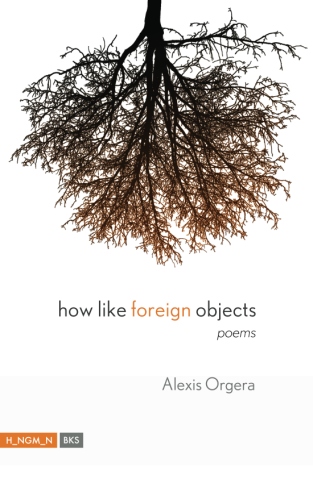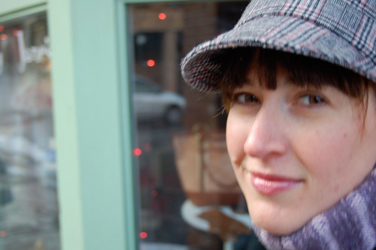
How Like Foreign Objects (H_NGM_N BKS, 2011).

How Like Foreign Objects (H_NGM_N BKS, 2011).
First Book Questionnaire: Alexis Orgera
1. Does your manuscript bear any relation to a graduate thesis project?
Not really. My graduate thesis was called A Map of Earth; both thesis and How Life Foreign Objects look at landscape and travel as modes of self-discovery, but that’s not very unique to me. A few poems from the grad thesis made it into the first book, but there were 10 or so years between grad school and HLFO. I’ve changed a lot, grown as a thinker and writer—and I’ve revised things into oblivion sometimes.
2. How do you feel about these poems now that they’ve materialized in book format?
I like them! I think, as a whole, the book paints a kind of narrative that’s very true to my experience. I like reading the poems out loud, though I do feel twinges of longing to get on to the next thing.
3. What was your experience when you began publishing? What challenges did you encounter?
Probably like most young poets, I had no effing clue what I was doing. Actually, I still don’t really. I never know when I send out a packet who’s going to like it and who isn’t. I send poems out 1. sporadically, 2. indiscriminately, or 3. by editor request.
Back in the beginning, sending out one packet or one manuscript was scary; it was end-all-be-all kind of scary. And the rejections were crushing. If you keep at it, though, it’s more like brushing your teeth.
4. How, if at all, did chapbooks prepare you for the making of a full-length collection?
Chapbooks are a great way to think about the shape of a manuscript without it getting too unwieldy. My first chap, Illuminatrix, was sort of all about these characters called Illuminators. The narrative structured itself based on the pre-existing framework. Plus, I was in a manic frenzy when I wrote the thing, so all of the poems were similar in that way.
My second chap, Dear Friends, The Birds Were Wonderful!, is a road-trip prose poem book. Again, it had its trajectory built in by virtue of its subject matter.
Working with editors (Matt Hart of Forklift and Justin Runge of Blue Hour Press) on these chaps really prepped me for a larger project. Let me tell you, both of those guys are fabulous to work with.
5. How did you shape and order your manuscript?
Well, if I’m being honest here, Matt Hart and Nate Pritts (H_ngm_n) both shaped and ordered the manuscript way more than I did. After Forklift published my first chap, I knew that Matt was a great reader and editor, so I sent him two manuscripts. He actually organized them into one manuscript, which I sent out to reading series and contests. Nate and crew picked up the book during the H_ngm_n Bks Open Reading Period. I’d never worked with Nate before, but we had an awesome in-person marathon editorial session once H_ngm_n Bks had accepted the manuscript for publication. We left the original structure, but added and subtracted some poems here and there.
Basically, in subsequent manuscripts, I do all of my ordering by felt narrative structure, echoes, and conversations between poems. In How Life Foreign Objects I think the overall “feeling” is one of the demise of both a relationship and former self.
There’s no formula. As you can see, I have found some editors whom I really trust. I have other trusted readers, too. Rick Bursky, Joseph Wood.
6. Was anyone or anything indispensable in the process of making your debut collection?
See above.
7. What is your impression of book contests?
My impression is that book contests exist to keep publishers afloat, and we need good publishers to publish our work. Without contests, where would they make a substantial portion of their income? It’s not like any of these people/institutions are getting rich off of our poems.
Do I think it’s sometimes a racket? Sure! I know of many instances in which winners are obviously connected to judges in some significant way. It annoys me, but I generally have an idealism about the best work winning out in the end.
A few of my manuscripts have been finalists or semi-finalists in contests. That’s actually a nice measure of whether what you’ve put together is readable or not!
8. How did you learn to navigate the press world?
You mean when will I learn to navigate the press world? You just have to read a lot and find publishers whose choices you admire. And send when you can. I have three more manuscripts just waiting around, and half the time I have no idea where to send them.
9. What aspirations did you have for this book?
Duh: National Book Award, Pulitzer Prize, LA Times Book Award. The usual.
10. How would you describe this work?
Lyric-narrative-heady-earthy-roaming-static-ecstatic-sometimes funny-musical poems?
11. Do you work primarily on discrete poems, serially, toward a project, with a set of concerns, or otherwise?
Usually I’m working with discrete poems, though I’ll get hooked on a certain subject matter and write circles around that for a while. Sometimes there are characters, as I’ve already explained. I’m working on a series about Saint Agatha right now, which is kind of gruesome—she’s the saint who had her boobs chopped off b/c she wouldn’t sleep with some duke.
I think I do form in chunks. For instance, I have a manuscript of prose poems that I wrote all in one time period. I have these long-lined couplet poems that I was writing for about six months.
12. Whose poems affect you or your work?
The poets who have had the biggest effect on me one way or another are Yusef Komunyakaa, AR Ammons, Dean Young, Elizabeth Bishop, Philip Levine, Mark Strand, Gail Mazur. The way I first started reading poetry was in anthology form—that went on for years, so I think it’s hard to say. I think I imbibed a ton of different voices, old and new. Right now, though, the thing I’m most focused on/enamored with is repetition, echo, breath, which seems to come directly out of Ammons’s “So I Said I Am Ezra” poem from Ommateum: with Doxology, his first book.
When I want to read poems out loud, I always go back to Plath for her poems’ ferocity, intricacy, and crackling. Then there are too many more contemporary individual books to name—I’m re-reading Mary Ruefle’s Among the Musk Ox People and Darcie Dennigan’s Corinna A-Maying the Apocalypse and reading Albert Goldbarth’s Griffin at the moment—but I read fairly widely and across genres; I suffer from short attention span syndrome, so it helps to keep things interesting!
13. What are you working on now?
I just finished up organizing two manuscripts—I’m proud to say that I organized them all by myself this time!
---
 Alexis Orgera is the author of two chapbooks, Illuminatrix (Forklift, Ink) and Dear Friends, The Birds Were Wonderful! (Blue Hour Press) and one full-length book, How Like Foreign Objects (H_ngm_n Bks). She lives in Florida where she is a freelance writer/editor and teaches writing at Ringling College of Art and Design.
Alexis Orgera is the author of two chapbooks, Illuminatrix (Forklift, Ink) and Dear Friends, The Birds Were Wonderful! (Blue Hour Press) and one full-length book, How Like Foreign Objects (H_ngm_n Bks). She lives in Florida where she is a freelance writer/editor and teaches writing at Ringling College of Art and Design.